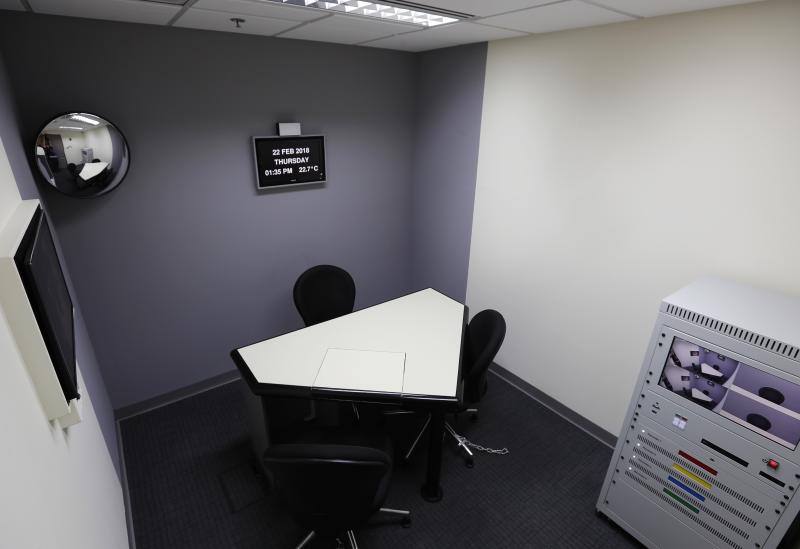Parliament: Parliament approves video-recorded interviews, other changes to criminal justice system
Sign up now: Get ST's newsletters delivered to your inbox

The interview room of the pilot One-Stop Abuse Forensic Examination Centre, set up by the police with the Singapore General Hospital to serve adult rape victims, in the Police Cantonment Complex.
ST PHOTO: KELVIN CHNG
SINGAPORE - Video-recording of statements taken from suspects will be introduced in phases, starting with the interviews of suspects of certain rape offences, Senior Minister of State for Law Indranee Rajah told Parliament on Monday (March 19).
The video-recording of these interviews is mandatory, she said, adding that enough police officers have been trained to implement the first phase.
This new requirement is among more than 50 diverse changes spanning the criminal justice system that was debated and approved by Parliament on Monday. These range from investigations to court processes and sentencing.
Ms Indranee said video-recording the interviews of the rape suspects will allow the courts to take into account their demeanour and also provide an objective account to help the court in deciding on allegations that may be raised about how the interview was conducted.
The legislation, however, will allow for flexibility to take into account operational exigencies, she added.
For example, there may be a need to record a handwritten statement immediately at the crime scene where a suspect is arrested.
The Government plans to eventually allow video statements of vulnerable victims to be used in place of their oral testimony in court. It will monitor the first phase before deciding how to put it into operation because the video recording of victim statements involve a lot of complexities, she said.
During the debate, Members of Parliament expressed support for the video-recording of suspects' statements, saying it makes the interview process more transparent.
Mr Patrick Tay (West Coast GRC ) said the move heeds the "longstanding calls from the legal fraternity".
Video-recording protects both the interrogator and the person being interrogated, added Mr Louis Ng (Nee Soon GRC). It deters the use of coercive practices by investigators and stops the accused from making false claims that their statements had not been given voluntarily.
Some aspects of the regime, however, worry MPs like Mr Ng.
He noted that video-recording will reduce instances of false confessions only if it captures the entire interaction between investigator and suspect.
He asked if there are guidelines to ensure the entire interview is recorded. The footage should focus equally on both suspect and police officer and show the whole room, he said.
Nominated MP Kok Heng Leun said if threats, inducements and promises were offered to the suspect prior to video recording, this would defeat the purpose of the video-recording.
Ms Indranee said it would not be feasible to record every exchange between a police officer and the accused person from the time of arrest until statement-taking.
She said the rooms for video-recorded interviews are purpose-built to ensure good quality of sound as well as picture.
One camera focuses on the interviewee and another captures an overview of the entire room, she added.
Nominated MP Mahdev Mohan asked why defence counsel are not allowed to have copies of the recordings.
Ms Indranee said this was to safeguard against recordings being leaked, lost or misplaced. Defence lawyers can view the recording at an approved place as many times as they want. They will also be given a transcript, she added.
The wide-ranging amendments to the Criminal Procedure Code and Evidence Act also includes protection measures for victims of sexual and child abuse, the introduction of deferred prosecution agreements in which corporations can be given amnesty from prosecution in exchange for complyng with certain conditions, an expansion of the eligibilty criteria for community sentences and strengthening the bail regime.
"These amendments, when set against the background of the changes that we have made over the past decade, are comprehensive and progressive. They keep pace with the evolving values of society and with international best practices," said Ms Indranee.


